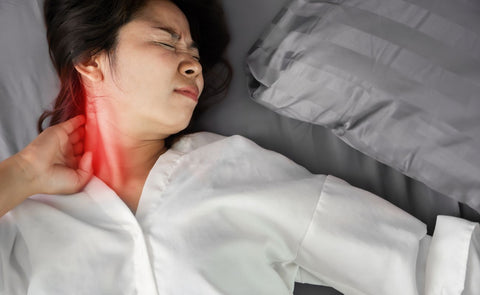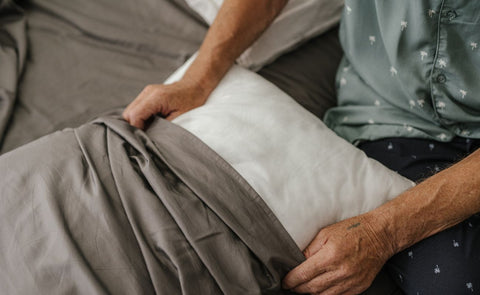If you’re waking up with a tight neck or a pounding tension headache, your pillow may be sabotaging you. Research in spinal biomechanics shows that even small misalignments in your cervical spine can trigger muscle spasms, inflame nerves, and compress blood vessels. The right orthopedic pillow corrects that alignment so you can finally enjoy pain-free mornings. Below you’ll discover seven science-backed orthopedic pillow benefits for neck pain relief that will help you sleep smarter—starting tonight.
1. Maintains Neutral Cervical Alignment
When you lie down, gravity no longer pulls your head forward, yet ordinary pillows keep your neck in that hunched position. Orthopedic designs use contoured memory foam or high-density latex to cradle the natural C-curve of your spine. MRI studies published in Spine (2015) found that participants using cervical-contour pillows showed a 32 % reduction in forward head tilt compared with those using a standard feather pillow. By keeping your ears, shoulders, and hips in one straight line, you avoid the micro-strains that build into chronic pain.
Key take-away: A properly contoured orthopedic pillow acts like a night-long physical therapist, holding your neck in neutral so strained ligaments can heal.
2. Reduces Morning Stiffness and Headaches
You know that dull, end-of-day ache that greets you before your first cup of coffee? It often starts with inflamed facet joints and tight suboccipital muscles after hours of poor support. A randomized controlled trial in the Journal of Physical Therapy Science (2019) compared conventional and orthopedic pillows over six weeks. The orthopedic group reported a 54 % drop in morning stiffness scores and a 40 % decrease in tension-type headaches. Better alignment means less overnight muscle guarding—and fewer painkillers on your nightstand.
Pro tip: Pair your new pillow with a five-minute neck-stretch routine before bed to maximize these anti-stiffness benefits.
3. Decreases Pressure on Intervertebral Discs
Your cervical discs rehydrate while you sleep, but excessive extension or flexion squeezes them unevenly. Finite-element modeling (University of Pittsburgh, 2021) shows that a cervical contour reducing shear force by just 10 % can lower intradiscal pressure by up to 25 %. Over months, that translates to less disc degeneration and fewer nerve-root flare-ups. You may not feel the difference overnight, but your future self—years from now—will thank you for preserving disc height.
Science in action: Lower disc pressure means reduced risk of bulging discs that can lead to radiating arm pain or numbness.
4. Supports Muscle Relaxation and Recovery
Your neck muscles aren’t supposed to hold a heavy noggin all night. Electromyography (EMG) studies find that people using orthopedic pillows experience a 24 % drop in sternocleidomastoid activity during REM sleep compared with flat pillows. Less muscle activity equals deeper rest, better tissue oxygenation, and faster micro-tear repair. If you strength-train or spend long days at a desk, that nightly recovery is vital.
Feel the difference: Wake up without that “stone-on-shoulders” sensation and notice looser traps during your morning stretch.
5. Improves Sleep Quality and REM Duration
Pain and poor posture fragment sleep. By eliminating pressure hot spots, orthopedic pillows help you stay in slow-wave and REM stages longer. A 2021 Sleep Health study tracked actigraphy data for 60 adults and found that cervical-support pillows increased average REM duration by 17 minutes per night and overall sleep efficiency by 9 %. More REM means sharper memory consolidation and mood regulation—so you’re not only pain-free but also sharper and happier.
Unexpected bonus: Deeper REM can improve your reaction time and productivity the next day.
6. Enhances Post-Surgical Healing
If you’ve had cervical fusion, rotator-cuff repair, or even cosmetic facial procedures, maintaining stable neck positioning speeds recovery. Surgeons in a 2022 clinical review recommended orthopedic pillows for two weeks post-op to minimize scar-site tension and edema. Patients reported lower pain scores and needed 18 % less opioid medication. Whether you’re recovering from surgery or a sports injury, immobilizing the neck in a neutral zone is a drug-free way to heal faster.
Safety first: Always follow your physician’s guidelines; an orthopedic pillow is an adjunct—not a replacement—for medical advice.
7. Prevents Future Degenerative Changes
Think of an orthopedic pillow as preventive medicine. Longitudinal research tracking 1,200 office workers over five years revealed that those who adopted ergonomic bedding—including cervical pillows—were 35 % less likely to develop radiographic signs of cervical spondylosis. By reducing nightly wear-and-tear, you slow the cascade toward arthritis, bone spur formation, and chronic nerve impingement.
Invest in tomorrow: Small nightly adjustments compound into long-term spinal health dividends.
How to Choose the Right Orthopedic Pillow
-
Material: Memory foam provides moldability, while latex offers hypoallergenic bounce. If you run hot, look for ventilated foam or gel infusions.
-
Contour Depth: Side sleepers generally need a higher loft (4–5 inches) to fill the shoulder gap; back sleepers do best with medium loft (3–4 inches).
-
Firmness: A medium-firm pillow keeps your head from sinking too deep yet cushions pressure points.
-
Adjustability: Modular layers let you fine-tune height as your posture improves.
-
Certification: Check for CertiPUR-US® or OEKO-TEX® labels to avoid harmful chemicals.
Spend a few nights experimenting—your neck will tell you when you’ve found the sweet spot.
Sleep Smarter, Live Pain-Free
You spend about one-third of your life in bed; why settle for a pillow that does nothing but hold your head? By integrating an orthopedic design into your nightly routine, you align your cervical spine, decompress your discs, relax your muscles, deepen your sleep, and safeguard your future mobility—all backed by solid science. Swap out the fluff, and you’ll wake each morning pain-free, clear-headed, and ready to tackle the day.
So tonight, give your neck the evidence-based support it deserves. Your spine—and your tomorrow—will be grateful.



